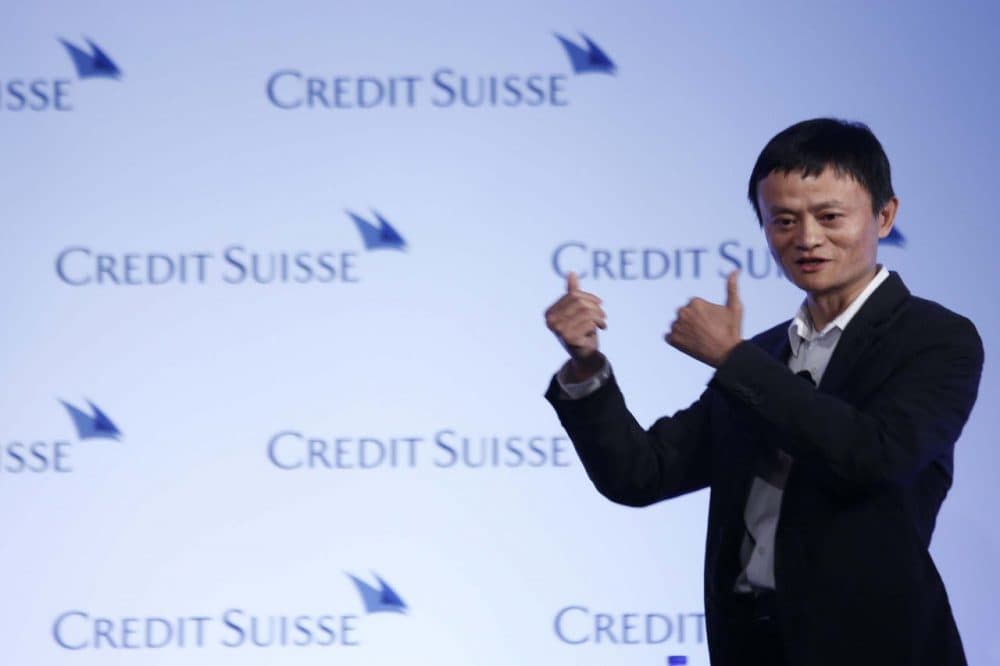Advertisement
Alibaba Is More Than Just A 'Chinese Amazon'

The news this week — late Tuesday, in fact — that China's tech giant Alibaba would be filling for an Initial Public Offering in the United States sent the stock watching-world all atwitter with excitement and grandiose pronouncements. (Literally a-Twitter: see the HUGE surge in US tweets about the company on Tuesday evening when the big news went public.)
Statements like "biggest I.P.O ever" or "most anticipated tech I.P.O." bounced around, but we were really interested in learning more about the prospectus the company filed, and hearing more about a company we covered back in March. What kind of company is Alibaba, anyway? And is fair to compare it to more familiar U.S. tech firms like Amazon, eBay or Facebook?
Reporter Lily Kuo — who covers emerging markets for Quartz — joined us back in March with bits and pieces of the larger Alibaba story, and she was kind to speak with On Point producer Nick Andersen this week in the aftermath of the I.P.O. filing to explain more about what is surprising — and not — in the Alibaba I.P.O.
"The first thing that was surprising to me was that they made it really clear that the focus of their growth for the foreseeable future is China," Kuo said. "They have been making so many investments in the US and around the world, they have the potential to be this big global company that has its fingers in so many pies. But they really emphasized that their growth is gonna be China."
That growth prospect is especially heady for a company operating successfully in a market like China, which, even with the largest number of Internet users, has a relatively low degree of Internet penetration and e-commerce use compared to the country's entire population, Kuo said. (Online shopping penetration is 49% in China, compared to 74% in the US, Kuo notes)
The filing also made it clear that, unlike so many in the Western media sphere — On Point included, we admit — Alibaba doesn't consider itself to be a mere mirror image of such well-known companies as Amazon, eBay and the like. Instead, they recognize their competitors as other Chinese companies — Tencent, Baidu, and more.
"That was surprising for me," Kuo said.
Kuo also pointed out that, while much of the hyperbolic and eager financial press coverage surrounding the filing explores whether or not Alibaba will ever aim for the Western markets it mostly misses at present, the company doesn't really need those markets to thrive.
"Their model really isn't suited for the U.S. market," Kuo said. "Their model is best suited to emerging market economies with growing middle classes who are just now buying more, just now finding extra disposable incomes. Those are the markets they should be compared to."
Of course, other coverage has pointed out the not-so-surprising fact that Alibaba recognizes its existence within the Chinese Internet space — behind the "Great Fire Wall" — as a major inhibitor for future company growth. It's important and maybe obvious, but operating within the vague, loose Chinese market is also something that Alibaba is clearly already very, very good at.
"Government regulation is definitely something that Alibaba has to deal with, that all Chinese companies have to deal with," Kuo said. "You can get in trouble with regulations because they weren't clear.
"But if anything, Alibaba is much more adept at dealing with Chinese market restrictions."
Perhaps the most interesting part of the filing was how deeply innovative so much of the gigantic Alibaba business enterprise truly is.
"Alibaba is a great example of Chinese companies developing and innovating beyond the models and company they were emulating," Kuo said. "China is a new market, so there's more opportunity to do innovative things. On Alibaba's e-commerce site, Taobao, they added this chat feature. Buyers could chat with sellers, with each other. People were hooking up with other buyers, saying, 'If all five of us buy it, the seller will give us a discount.' So eventually, Alibaba built that feature in. And that system predates GroupOn. There are people who meet on Taobao and get married. There's this human aspect of the platform, an innovative aspect.
"Alibaba built the e-commerce infrastructure in China. Through things like Alipay, which created a way to inspire trust between buyers and sellers, through their logistics network — it's because of that that they have such a dominant market share. They've paved the way for these other market sites in China, who are becoming their rivals now."
What do you make of the Alibaba excitement? Do you care? Do you think that kind of creative innovation in the Chinese market could come to U.S. companies? Let us know in the comments below, or on Facebook, Tumblr and @OnPointRadio.
-- Nick Andersen